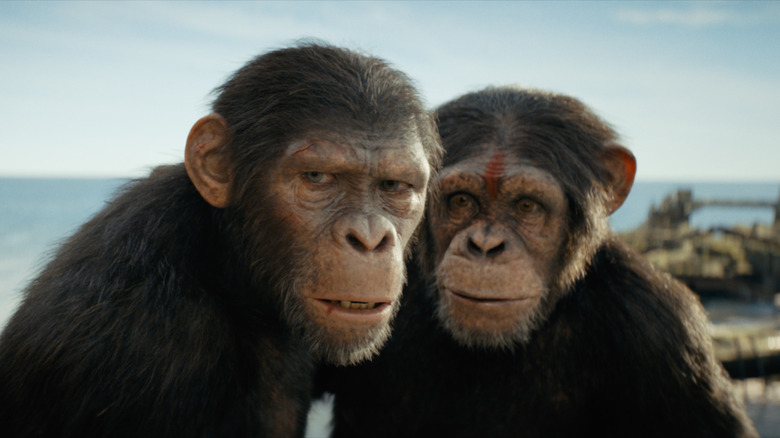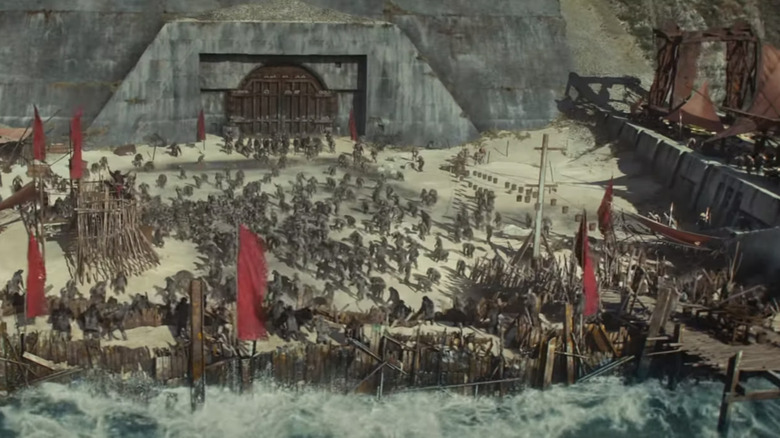Kingdom Of The Planet Of The Apes Explores The Origins Of The Forbidden Zone
Of all the movies debuting this summer, I am most looking forward to "Kingdom of the Planet of the Apes." This series has been on a roll since the 2011 reboot and I'm excited to see it take a new direction more akin to the original films
300 years after the events of "War for the Planet of the Apes," Ape-kind has entered its Bronze Age. They've also forgotten Caesar's (Andy Serkis, who's sitting this one out) first teaching — "Apes together strong!" — and splintered into different and warring tribes. The chimpanzee Noa (Owen Teague) must go on a journey after his people are attacked by apes from the kingdom of Proximus Caesar (Kevin Durand). The trailers for "Kingdom of the Planet of the Apes" have been teasing the state of this new ape-ruled world. Green forestry has reclaimed the land and the apes live in the shadow of decaying structures built by humans (think of how people in the Dark Ages lived among remnants of the more advanced but collapsed Roman civilization).
The latest issue of Total Film magazine includes a feature on "Kingdom of the Planet of the Apes" that details some more worldbuilding, and reveals that the film will bring back the idea of an ape "Forbidden Zone," a concept from the original movie. (In fact, "Forbidden Zone" was the working title for "Kingdom.")
'The Forbidden Zone was once a paradise! Your breed made a desert of it'
In the original 1968 "Planet of the Apes," the apes are a repressive society that deems science and religion indistinguishable. One of their tenets is the "Forbidden Zone," a deserted area off-limits to all apes. You see, the Forbidden Zone is the island of Manhattan (post-nuclear war) and contains remnants of humanity's civilization (including the Statue of Liberty, shown in the film's famous twist ending). The orangutan Dr. Zaius (Maurice Evans) knows what the Forbidden Zone contains and works to keep it untouched, fearing that the building blocks of his society will come tumbling down if his fellow apes learn the truth about the humans they hunt.
Teague explains Noa belongs to a community of apes called "The Eagle Clan" (the trailer includes some shots of an apparently domesticated golden eagle perching on Noa's arm). The Eagle Clan "has its own kind of lies," Teague explains, "They're an isolationist society. It's a small village but they have a territory. And Noa isn't allowed outside that territory. The majority of the clan are kept within the boundaries."
That sounds quite like the ape society from the original film, right down to the adjacent existence of a Forbidden Zone. Production designer Daniel T. Dorrance says that for the border of the Eagle Clan's territory and the Forbidden Zone, the film used an abandoned train tunnel the crew found while shooting in Australia.
There's been a question from the beginning of how closely the rebooted "Ape" films tie into the original. Is this all leading up to another remake? "Kingdom" screenwriters Rick Jaffa and Amanda Silver indicate to Total Film that they don't want to go that far, but they are interested in the "natural progression" towards the society that Charlton Heston's time-stranded astronaut George Taylor encountered in the 1968 "Planet of the Apes."
"Kingdom of the Planet of the Apes" releases in theaters on May 10, 2024.

